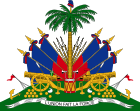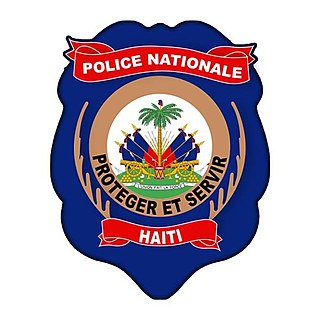 |
|---|
The National Council of Government (French : Conseil National de Gouvernement, CNG) was the ruling body of Haiti from 1986 to 1988.
 |
|---|
The National Council of Government (French : Conseil National de Gouvernement, CNG) was the ruling body of Haiti from 1986 to 1988.
The council was first established on February 7, 1986, as a joint military and civilian provisional government following the exile of President for life Jean-Claude Duvalier, at the height of the anti-Duvalier protest movement. The council, under the presidency of Lieutenant General Henri Namphy, consisted of five members, three from the military and two civilians. The military members were Colonels Williams Régala, Max Valles, and Prosper Avril. In contrast the civilian members were Gérard Gourgue and Alix Cinéas.[ citation needed ]
Gourgue resigned from the council less than two months after it was formed, and Colonel Valles, Colonel Avril, and Cinéas were forced to resign soon after. The first National Council was officially dissolved on March 20, 1986. During its short life, the council took two important actions: it dissolved President Duvalier's paramilitary forces, the Tonton Macoute (French : Volontaires de la Sécurité Nationale, VSN) on February 15, and restored the blue and red flag of Haiti on February 17.[ citation needed ]
A second National Council with three constituents was established on March 21, 1986, the day after the first council was dissolved. The two remaining men of the first council, Henri Namphy and Williams Régala, kept their positions. Jacques A François joined the council as the second member. This version of the National Council ruled until February 7, 1988, when Leslie Manigat (elected in the 1988 general election) took office as President of Haiti.[ citation needed ]

Leslie François Saint Roc Manigat was a Haitian politician who was elected as President of Haiti in a tightly controlled military held election in January 1988. He served as President for only a few months, from February 1988 to June 1988, before being ousted by the military in a coup d'état.

Matthieu Prosper Avril is a Haitian political figure who was President of Haiti from 1988 to 1990. A trusted member of François Duvalier's Presidential Guard and adviser to Jean-Claude Duvalier, Lt. Gen. Avril led the September 1988 Haitian coup d'état against a transition military government installed after Jean-Claude Duvalier's 1986 overthrow. He was President until March 1990, in a period which according to Amnesty International was "marred by serious human rights violations". He was arrested in 2001, but released in March 2004 after the 2004 Haitian coup d'état overthrew Jean-Bertrand Aristide.

Henri Namphy was a Haitian general and political figure who served as President of Haiti's interim ruling body, the National Council of Government, from 7 February 1986 to 7 February 1988. He served again as President of Haiti from 20 June 1988 after the June 1988 coup that he led, until his deposition on September 17, 1988 in the September coup.

Hérard Abraham was a Haitian military officer and politician who served as the acting President of Haiti in 1990, helping to lead its democratic transition.

General elections were held in Haiti on 7 February 2006 to elect the replacements for the interim government of Gérard Latortue, which had been put in place after the 2004 Haiti rebellion. The elections were delayed four times, having originally been scheduled for October and November 2005. Voters elected a president, all 99 seats in the Chamber of Deputies of Haiti and all 30 seats in the Senate of Haiti. Voter turnout was around 60%. Run-off elections for the Chamber of Deputies of Haiti were held on 21 April, with around 28% turnout.
Paul Arcelin is a Haitian who lived in Canada for many years in exile from the Duvalier dictatorship because of his political activities. He married a Canadian woman with whom he raised two children in Montréal.
Jean-Claude Bajeux was a Haitian political activist and professor of Caribbean literature. For many years he was director of the Ecumenical Center for Human Rights based in Haiti's capital, Port-au-Prince, and a leader of the National Congress of Democratic Movements, a moderate socialist political party also known as KONAKOM. He was Minister of Culture during Jean-Bertrand Aristide's first term as President of Haiti.

The Haitian National Police is the law enforcement and de facto police force of Haiti. It was created in 1995 to bring public security under civilian control as mandated in Haiti's constitution. As at 2023 the force has 9,000 active duty officers.

Social class in Haiti uses a class structure that groups people according to wealth, income, education, type of occupation, and membership in a specific subculture or social network. Since the colonial period as part of the colony of Saint-Domingue (1625–1804), race has played an important factor in determining social class.

The Armed Forces of Haiti, consisted of the Haitian Army, Haitian Navy, the Haitian Air Force, Haitian Coast Guard, Agence Nationale d'Intelligence (ANI) and some police forces. The Army was always the dominant service with the others serving primarily in a support role. The name of Haiti's military was changed from The Indigenous Army to the Garde d'Haiti after the U.S. invasion and occupation of Haiti in 1915. Then to the Forces Armées d'Haïti—FAd'H in 1958 during the rule of François Duvalier. After years of military interference in politics, including dozens of military coups and attempted coups, Haiti disbanded its military in 1995.
The origins of the military history of Haiti lie in the country's revolution. A decade of warfare produced a military cadre from which Haiti's early leaders emerged. Defeat of the French demonstrated Haiti's considerable strategic stamina and tactical capabilities. The armed forces, who had been united against the French, fragmented into warring regional factions. The military very soon took control of almost every aspect of Haitian life. Officers assumed responsibility for the administration of justice and for municipal management. According to a Haitian diplomat, the country was in its earlier days "an immense military camp." Without viable civilian institutions, Haiti was vulnerable to military personalities, who permanently shaped the nation's authoritarian, personalist, and coercive style of governance.
The St. Jean Bosco massacre took place in Haiti on 11 September 1988. At least 13 people were killed and around 80 wounded in a three-hour assault on the Saint-Jean Bosco church in Port-au-Prince, which saw the church burned down.
Williams Régala was a former member of Haiti's National Council of Government. He was a member of the short-lived first council, as well as the second council, which ruled until 7 February 1988, when Leslie Manigat took office
The June 1988 Haitian coup d'état took place on 20 June 1988, when Henri Namphy overthrew Leslie Manigat. Manigat, who won the military-controlled 1988 general election, had taken office on 7 February.
The September 1988 Haitian coup d'état took place on 18 September 1988, when a group of non-commissioned officers in the Haitian Presidential Guard overthrew General Henri Namphy and brought General Prosper Avril to power. Namphy had been a member of the National Council of Government from 1986 until the February 1988 inauguration of Leslie Manigat, who had won the military-controlled 1988 general election. Namphy had overthrown Manigat in the June 1988 coup d'état when Manigat sought to exercise his constitutional right to control military assignments.
Leslie Delatour (1950–2001) was a Haitian economist who served as governor of the Bank of the Republic of Haiti from 1994 to 1998, and as Haiti's Minister of Finance from 1986 to 1988.

The Anti-Duvalier protest movement was a series of demonstrations in Haiti from 23 May 1984 to 7 February 1986 that led to the overthrow of President Jean-Claude Duvalier and the Duvalier dynasty regime and the readoption of the original flag and coat of arms of the country.

The Duvalier dynasty was an autocratic hereditary dictatorship in Haiti that lasted almost 29 years, from 1957 until 1986, spanning the rule of the father-and-son duo François and Jean-Claude Duvalier.
Yves Volel was a Haitian lawyer, activist, and presidential candidate. He was assassinated in 1987 while running for office. He was the leader of an offshoot of the Haitian Christian Democratic Party, led by Sylvio Claude, known as the Christian Democratic Rally.
Gérard Gourgue was a Haitian politician and human rights activist. He ran for President in 1988.